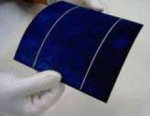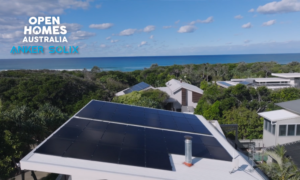Mitsubishi Electric Corporation has announced it has set two new world records for solar cell conversion efficiency
The first is in relation to standard polycrystalline cells and was achieved by reducing resistive loss in the cells. A certain amount of electricity generated in PV cells is dissipated as heat due to resistive loss between silicon wafers and electrodes, so reducing the contact resistance at electrodes can improve conversion efficiency.
Mitsubishi has claimed a 19.3-percent efficiency rating polycrystalline silicon PV cell of 100 squared centimeters or larger, with the PV cell measuring approximately 15 cm x 15 cm x 200 micrometers. The rating is 0.2 points higher than the company’s previous record of 19.1 percent.
The second world record was achieved with the same technologies in a thin film polycrystalline silicon PV cell measuring approximately 15 cm x 15 cm x 100 micrometers. The company says it has achieved an efficiency rating of 18.1 percent, a 0.7-point improvement over the company’s previous record of 17.4 percent.
The conversion efficiency rates have been confirmed by the National Institute of Advanced Industrial Science and Technology (AIST), in Japan.
Solar cell conversion efficiency relates to how much sunlight is converted into electricity, with higher rates meaning more output.
According to Mitsubishi, global production of PV cells reached 5,500 megawatts (MW) between March 2008 and March 2009, and is expected to reach 8,000 MW in 2012. With the use of crystalline silicon PV cells continuing to increase, solar cell manufacturers are always searching for ways to improve the conversion efficiency of these cells to gain more output power while reducing the thickness of PV cells, thereby reducing the amount of silicon used. Silicon is the most expensive material in a solar panel and one that is also subject to supply instability.














































